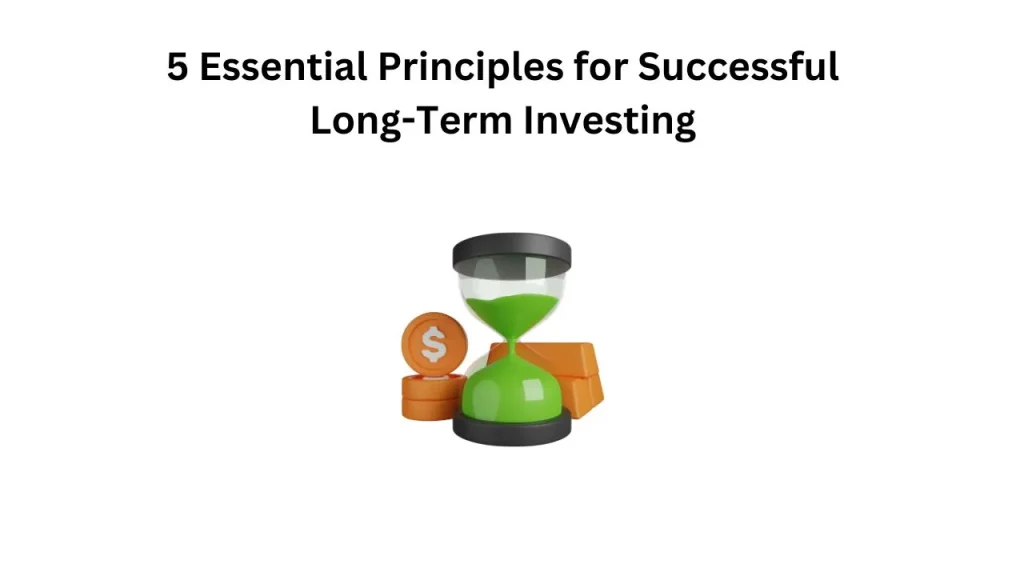In the dynamic world of finance, mastering the art of long-term investing is paramount for building a secure financial future. Whether you’re a seasoned investor or just dipping your toes into the market, understanding the fundamental principles of successful long-term investing can make all the difference. In this comprehensive guide, we’ll unravel the five essential principles that serve as the cornerstone of prosperous long-term investments.

The Foundation of Success: 5 Essential Principles for Successful Long-Term Investing
Establish Clear Investment Goals
Setting clear and achievable investment goals is the first step towards success in the world of long-term investing. Whether you’re saving for retirement, a new home, or your children’s education, defining your objectives will provide direction and focus to your investment strategy. By understanding your financial aspirations and timeline, you can tailor your investments to align with your specific needs and risk tolerance.
Embrace Diversification
Diversification is the bedrock of a resilient investment portfolio. By spreading your investments across different asset classes, sectors, and geographical regions, you can mitigate risk and maximize returns over the long run. A well-diversified portfolio ensures that the performance of any single investment won’t have a disproportionate impact on your overall wealth, shielding you from market volatility.
Adopt a Long-Term Mindset
Successful long-term investing requires patience and discipline. Instead of succumbing to the allure of short-term gains, focus on the enduring value of your investments over time. By maintaining a long-term perspective, you can weather market fluctuations and harness the power of compounding to grow your wealth exponentially. Remember, time is your greatest ally in the journey towards financial independence.
Stay Informed and Educated
In the ever-evolving landscape of finance, knowledge is power. Stay informed about market trends, economic indicators, and regulatory changes that may impact your investments. Continuously educate yourself through reputable sources, financial publications, and seminars to refine your investment strategy and adapt to shifting market dynamics. A well-informed investor is better equipped to make sound decisions and navigate uncertainty with confidence.
Practice Discipline and Patience
Discipline and patience are virtues that separate successful investors from the crowd. Avoid impulsive decisions driven by fear or greed, and adhere to your investment plan with steadfast resolve. Remember that market fluctuations are inevitable, but sticking to your long-term strategy can help you ride out the storms and capitalize on opportunities that arise. Cultivate discipline and patience, and let the power of compounding work its magic over time.
FAQs (Frequently Asked Questions)
How can I determine my risk tolerance?
Determining your risk tolerance involves assessing your financial situation, investment goals, and comfort level with market volatility. Consider factors such as your time horizon, income stability, and willingness to accept fluctuations in the value of your investments. Consult with a financial advisor to evaluate your risk tolerance and design a suitable investment strategy.
What role does asset allocation play in long-term investing?
Asset allocation refers to the distribution of your investment portfolio across different asset classes, such as stocks, bonds, and real estate. It plays a crucial role in managing risk and achieving optimal returns over the long term. By diversifying your investments based on your risk tolerance and investment objectives, you can balance potential rewards with acceptable levels of risk.
How often should I review my investment portfolio?
It’s essential to review your investment portfolio regularly to ensure that it remains aligned with your financial goals and risk tolerance. While there’s no one-size-fits-all approach, many investors opt to conduct quarterly or annual reviews. During these reviews, assess the performance of your investments, rebalance your portfolio if necessary, and make any adjustments based on changes in your financial circumstances or market conditions.
What are some common mistakes to avoid in long-term investing?
Some common mistakes to avoid in long-term investing include succumbing to emotional decision-making, timing the market, chasing hot investment trends, and neglecting to diversify your portfolio. It’s crucial to stay disciplined, adhere to your investment plan, and focus on the long-term fundamentals rather than short-term fluctuations.
How can I minimize taxes on my investment returns?
Minimizing taxes on your investment returns requires careful planning and consideration of tax-efficient investment strategies. Utilize tax-advantaged accounts such as IRAs and 401(k)s, maximize contributions to these accounts, and consider tax-loss harvesting to offset capital gains. Consult with a tax advisor or financial planner to explore strategies that align with your investment goals and tax situation.
Is it ever too late to start investing for the long term?
No, it’s never too late to start investing for the long term. While early investment offers the advantage of time and compounding growth, even late starters can benefit significantly from long-term investing. The key is to develop a clear investment plan, stick to your goals, and harness the power of disciplined investing over time.
Conclusion: Charting Your Course to Financial Success
In conclusion, mastering the five essential principles for successful long-term investing is the key to unlocking financial prosperity and security. By establishing clear goals, embracing diversification, adopting a long-term mindset, staying informed, and practicing discipline, you can navigate the complexities of the financial markets with confidence and achieve your wealth aspirations. Remember, investing is a journey, not a destination. Stay the course, stay informed, and watch your wealth grow over time.

